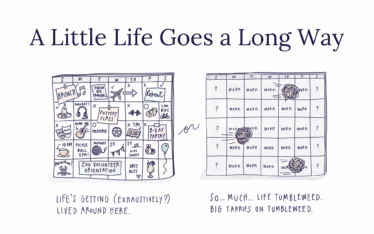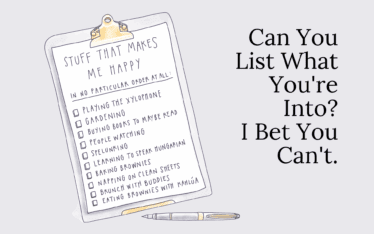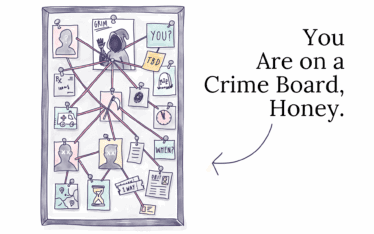 In an ongoing effort to remind you to live like you mean it before your eventual and inevitable demise (hi! I splash existential cold water in your face because I care!), I wanted to open up a whole new can of psychological worms with you today.
In an ongoing effort to remind you to live like you mean it before your eventual and inevitable demise (hi! I splash existential cold water in your face because I care!), I wanted to open up a whole new can of psychological worms with you today.
Are you psychologically safe with yourself?
I’ll back up for a quick definition refresher:
Psychological safety is the feeling and belief that you can share your ideas, opinions, thoughts, questions, concerns, and mistakes without the fear of being made to feel like an idiot.
Dr. Amy Edmondson (a.k.a., fairy godmother of psychological safety) defines this concept as “a shared belief that the team is safe for interpersonal risk-taking.” So it’s really a workplace/ team/ group construct, and when things ain’t so psychologically safe at work, it usually bubbles up and sounds like this:
- “I don’t want to ask a question about the client’s history because my boss will tell me—in front of the team and in a really sarcastic tone—that I should really know the answer by now.”
- “I can’t offer a new idea to this brainstorming meeting because Mindy will ice me for the rest of the week. She needs to be the one with the good ideas.”
- “If I raise a concern about our Q3 strategy, I’m pretty sure our VP will make sure I don’t get the good assignments.”
- “If I admit that I screwed up the formula in the spreadsheet I just know my leader will get all passive-aggressive and ask me if I need to attend an Intro to Excel course. I’ll just bury my mistake somehow.”
- “If I raise my hand in this town hall meeting I will spontaneously combust.” (Not every reluctant-to-contribute example reveals a psychologically unsafe team environment; a shy colleague might struggle to offer his opinions, even if the team has a warm and wonderful and welcoming culture of “no question is a stupid question!” and “we fail forward!”. Sometimes some of us just lack confidence, even in super psychologically safe, supportive spaces.)
Okay so how does this relate to you? I’m glad you asked. Back to the worms.
Your most important relationship is the one you have with yourself (well, that and the guy at Total Wine who makes such good recommendations), so how might you answer the questions I dredged up after reading Dr. Timothy Clark’s four stages of psychological safety?
Stage 1—Inclusion safety: This first stage refers to satisfying the basic human need of belonging and connecting. In this level of safety, you feel safe and accepted to be who you authentically are—quirky characteristics and all.
- How accepting are you of your quirks, of your you-ness? To what extent do you chastise vs. accept yourself for the way you look/ think/ get work done/ parent/ present in front of a group/ roast a chicken? Do you make yourself feel like you belong, or do you treat yourself like a catty sixth-grade girl? (Oof.) Being psychologically safe with yourself looks more like acceptance for your flaws, rather than a lifetime of being hard on yourself for “not being creative enough,” for example.
Stage 2—Learner safety: By this stage you feel safe to ask questions, learn, and experiment. You feel open to giving and receiving feedback, and you feel safe to make mistakes.
- How kind are you to yourself when you screw up? What does the voice in your head say: something like, “it’s okay—you tried and it didn’t work out this time, yet look at all these lessons you learned,” or… “you’re a total fucking failure, Failure Boy”? One of those voices sounds a little more psychologically safe than the other, no?
- How willing are you to try new things, even if you aren’t good at them out of the gates? Are you willing to take a risk and try a new recipe at a dinner party? Are you willing to experiment with a new career? Are you open to trying yoga even though you’re “not flexible enough”? Being psychologically safe with yourself means trusting that your ego can handle not mastering downward dog after class number one and also being graceful with yourself if your chicken piccata looks nothing like they did it on The Bear.
Stage 3—Contributor safety: At this stage you feel safe to make valuable contributions using your experience and talents.
- To what extent are you using your gifts… the strengths you possess or suspect you have potential to grow? Are you stifling an interest or talent because you feel insecure/ show-offy/ weird/ scared/ intimidated to let people see the side of you who plays the pan flute/ loves ballroom dancing/ wants to lead the team/ creates a mean project management document/ carves little wooden gnomes? If you are psychologically safe with yourself you don’t hold back; you leverage and maximize and step boldly into the most excellent parts of yourself. As Marianne Williamson said, “…Your playing small does not serve the world. There is nothing enlightened about shrinking so that other people won’t feel insecure around you. We are all meant to shine, as children do.” High five to psych safety, Marianne!
Stage 4—Challenger safety: This last stage looks like feeling safe enough to challenge the status quo when you see an opportunity for improvement or change.
- How open are you to adopting new ideas when information bubbles up and differs from your current beliefs? Are you open to considering new perspectives (i.e., psychological safety), or are you rigidly double-downing on your existing knowledge and hypotheses (i.e., psychological UNsafety)… because it requires a shit ton of intellectual humility to override your world assumptions/ your need to be right/ your desire to be in control/ your resistance to being a beginner/ laziness to rewire your brain?
- When you know you need to make a change (oh, like in your job/ love life/ eating patterns/ financial plan/ getting back on the therapy wagon to figure out the whole hoarding thing/ etc. etc. etc. [hopefully not all of the above for you today]), are you up for the challenge? Are you up to taking one small step forward? Are you willing to demonstrate to yourself that your happiness is worth risking the initial discomfort of change… in the spirit of Going For It and Feeling Alive?
So now what?
I need help with stage 1 (acceptance of myself) and stage 4 (willingness to make the changes I deep down know I need to make, dammit). I’m okay with learning and making mistakes (stage 2), and contributing (stage 3)—oh, I take that back, I need help there, too. Super. The life-long self-improvement project continues.
How does one create a psychologically safe life with oneself? It starts with awareness, that perennial precursor to change. It means you shine the spotlight for a week or so on the areas where maybe you’re a bit mean to yourself/ downright scary-unsafe, and you start to watch for it. I’ll watch for my Mean Girls voice about the way I look, for example, and when I hear her put me down for still wearing skinny jeans even though they are supposed to be out, I’ll punch her in the throat ask her to be kinder to herself in the mirror and tell her it’s okay to not be on trend with the ever-changing denim market because how can one ever really keep up?
I’ll also talk to my coach about these stages where I need help, so she can nudge me and help hold me accountable (like to the changes I need to make on my website but for some reason am afraid to do? Weird, but whatever).
The bottom line: if we notice where we’re unsafe with ourselves and ask if it’s helpful or hurtful, we stand a chance to be more loving (or maybe just less assholey) to ourselves. Life’s too short to treat ourselves anything less than fabulously, right?
As promised, the worms are out of the can. Now go keep them safe.

P.S.: I didn’t mention by book, You Only Die Once: How to Make It to the End with No Regrets, even once in this post. That was so odd! So I am mentioning it now.
P.P.S.: Let’s connect on Instagram!
P.P.P.S.: Oh and just in case you missed it… I’d love you forever if you took 16 minutes out of your life to watch my TEDx talk!






